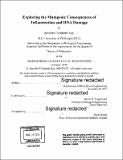Exploring the mutagenic consequences of inflammation and DNA damage
Author(s)
Kay, Jennifer Elizabeth, Ph. D. Massachusetts Institute of Technology
DownloadFull printable version (14.67Mb)
Other Contributors
Massachusetts Institute of Technology. Department of Biological Engineering.
Advisor
Bevin P. Engelward.
Terms of use
Metadata
Show full item recordAbstract
Inflammation is a major risk factor for many types of cancer, and the physiological processes involved in inflammation can contribute to many aspects of cancer development. Inflammation entails reprogramming of cell behaviors that resemble cancer, such as increased proliferation and signals for survival and migration, and it also entails production of reactive chemical species, which can damage DNA to promote genetic instability, another hallmark of cancer. While much research has been dedicated to studying the relationships between inflammation and cancer, it has been difficult to distinguish the relative contributions of modified cell behavior and de novo mutagenesis to the development of cancer. Furthermore, few studies have addressed the role(s) inflammation plays in cancer initiation versus promotion. Here, we utilized a transgenic mouse for detecting mutations in a variety of models of inflammation to parse the mechanisms by which inflammation contributes to mutations and cancer. The RaDR mouse, developed in the Engelward lab, contains a ubiquitously expressed transgene that enables detection of sequence rearrangement mutations following aberrant homologous recombination (HR). These mice also contain the Gpt-[delta] transgene for detecting point mutations and deletions, enabling unprecedented breadth and depth of possible mutation analyses in a single tissue. Our studies began by querying whether elements that regulate inflammation protect against mutagenesis in RaDR animals. We then studied RaDR mutagenesis in several models of intestinal inflammation and cancer. Together, these experiments showed that inflammation does not significantly induce de novo sequence rearrangement mutations, but it greatly increases the overall burden of mutant cells in a tissue as a result of heightened proliferation and clonal expansion. We also used the RaDR mouse model to expand upon studies of DNA repair pathway balance. DNA damage is addressed by a network of pathways, each designed to identify and repair specific types of lesions. One of the most important repair pathways for DNA damage caused by inflammation is the Base Excision Repair (BER) pathway, and we have previously found that BER intermediates can increase the frequency of mutagenic HR. Here, we expand upon that information, showing that acceleration of the BER pathway by increased expression of an initiating enzyme does not increase sequence rearrangement mutations, provided the downstream pathway can be resolved efficiently. Together, the studies described herein demonstrate that inflammation is unlikely to initiate cancer via sequence rearrangement mutations, but inflammation is a strong promoter of cancer in part through increased clonal expansion of mutant cells.
Description
Thesis: Ph. D., Massachusetts Institute of Technology, Department of Biological Engineering, 2018. Cataloged from PDF version of thesis. Includes bibliographical references.
Date issued
2018Department
Massachusetts Institute of Technology. Department of Biological EngineeringPublisher
Massachusetts Institute of Technology
Keywords
Biological Engineering.